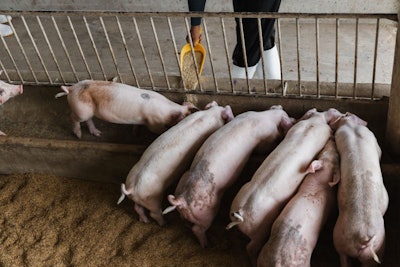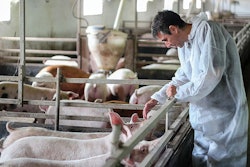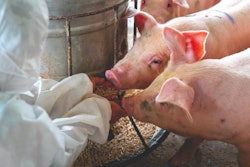
Animal feed, bedding and vehicles should be regarded as possible routes for the transmission of the African swine fever (ASF) virus to pigs in Europe, according to new research.
Decontamination and storage should be carried out on all materials moved from an area infected with African swine fever (ASF) to one that is free of the disease. That is the key recommendation from the European Food Safety Authority (EFSA). This advice applies particularly to feed, bedding material and pig transport vehicles.
This comes after an investigation by the EFSA Panel of Animal Health and Welfare, which examined a range of pathways for the possible transmission of the ASF virus. The panel investigated 17 products and matrices, and ranked them with respect to the likelihood of each becoming contaminated with the virus.
Results of the study — titled “Ability of different matrices to transmit African swine fever virus” — have been published in the EFSA Journal.
According to the authors, higher risks of transmitting ASF come from the movement of live pigs, or allowing them into contact with wild boar. However, the researchers considered that the risks from feed, bedding, and vehicles should not be excluded.
How to mitigate the spread of ASF in feed is the subject of a recent Feed Strategy podcast.
Three European states register new ASF cases in pigs
In the week of April 22-28, three countries registered new cases of ASF in domestic pigs, according to the Animal Disease Notification System from the European Commission (EC). With a total of 82 outbreaks in the region, 71 were in Romania, nine in Poland and two in Ukraine.
In Poland, this represents a significant spread of the disease in pigs. In mid-March, some of the near-16,000 animals at a farm in the western province of Lubusz tested positive for the ASF virus. That was the first outbreak in the country’s domestic animals since October 2020. It appears that the infection has now infected nine more farms. No details are given on their location or the number of pigs involved.
Since ASF first arrived in Romania in 2019, numerous outbreaks have occurred in backyard pig herds across much of the country. Reports received from the veterinary authority by the World Organisation for Animal Health (OIE) over the past week outline a further 27 ASF outbreaks in small, non-commercial herds of up to 37 pigs. Six carcasses found dumped at another location also tested positive for the ASF virus.
However, in an unusual development, ASF was also found at two commercial farms in Romania. At one premises with more than 25,200 animals in the westernmost county of Timis, 17 pigs died as the result of an outbreak in mid-April. On the same day, the virus was detected at a farm with around 16,200 pigs in neighboring Arad after 64 animals died.
Germany, China discuss regionalization at pork trade talks
Among the key topics discussed at high-level Sino-German government trade talks last week was the ASF situation. For this session, the German Chancellor and the Prime Minister of the State Council of the People’s Republic of China were present, as well as federal minister for food and agriculture, Julia Klöckner.
According to the German agriculture ministry, the primary aim of the discussions was the restoration of pig meat exports from Germany to China. With agreement over regionalization, Klöckner said the former supply relationship between the states could resume for pork produced in ASF-free regions of Germany. She stressed that the disease is present only in wild boar in two federal states, and that Germany’s domestic pigs remain free of ASF. Discussions are ongoing between experts of the two parties.
Expansion in China’s pig herd is being held back by the return of ASF, combined with falling live pig prices, according to a new analysis.
Since Germany’s first outbreak in September 2020, the number of ASF cases now stands at 1,104, according to the national veterinary agency, the Friedrich-Loeffler Institute. This total was reached on May 3.
With 952 confirmed cases since September 2020, the eastern state of Brandenburg continues to bear the brunt of ASF infections (as of April 30). Positive cases have been detected in five districts, according to the agriculture ministry. Of the total, 549 cases have been found in Oder-Spree, making this the worst-affected district for ASF-infected wild boar in Germany.
Neighboring Saxony is the only other state where ASF-positive cases have been detected among wild boar. By May 4, this total had reached 152. This is an increase of 44 since April 26, reports the agriculture ministry. All infected cases so far have been found in the district of Görlitz. Germany’s domestic pigs have so far remained free of ASF.
EU eases trade ban on pork imports from Bulgaria
At the end of April, the EC lifted restrictions on imports of pigs and pork products from some parts of Bulgaria, according to the nation’s food safety agency (BFSA). Previously, trade restrictions put in place because of ASF outbreaks had covered nine districts where the majority of the country’s commercial farms are located.
While the EC lifted some districts from these controls during March, the BFSA is has urged the EC to restore complete national freedom in this trade at the earliest possible date.
New cases in wild boar in nine European countries
In its latest update for the period April 22-28, the EC notification system added 263 outbreaks in wild boar from eight states in central and eastern Europe.
Of this total, 110 were in Hungary, 69 in Slovakia, 36 in Poland and 35 in Romania. Lower numbers of ASF cases were registered over this period in Germany (8), Latvia (3), and Lithuania and Ukraine (each with one outbreak).
Together with figures from the same source to April 18, the number of ASF outbreaks in wild species across Europe for the first four months of the year will come to around 5,300. For comparison, the EC registered 11,027 ASF outbreaks in wild boar in the whole of 2020, and 6,407 in the previous 12 months.
Over the past week, two countries have informed the OIE about new cases among their respective wild boar populations. In Romania, there have been 55 new outbreaks, involving 95 animals. Latvia’s veterinary authority has registered a further three new cases.
Latest report from the chief veterinary office in Poland outlines 50 outbreaks involving 63 wild boar found between March 26 and April 21. These latest cases were located in seven provinces. In the west of the country, Lubusz continues to be the worst affected by the disease, recording 768 outbreaks so far this year. According to this source, the Polish total cases so far this year now stands at 1,225.
No new cases in wild boar (or domestic pigs) have been detected in Moldova. According to official reports to the OIE, no ASF-positive animals have been found in this east European state since September 2020. From the first cases in December 2019, 178 wild boar and nine domestic pigs tested positive for the ASF virus in four west Moldovan districts that border Romania.
View our continuing coverage of the global African swine fever situation.
















